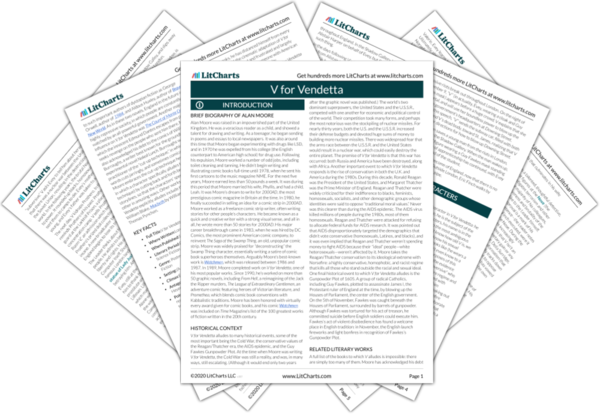Summary
Analysis
On November 6, in the evening, Lewis Prothero, the Voice of Fate, is reading his messages over the radio, so that millions of Londoners will be able to hear them. Dascombe explains to Derek Almond that Prothero will avoid talking about the fireworks following the explosion last night—if anyone asks, he’ll say it was a freak accident triggered by the demolition. Dascombe goes on to explain that Prothero has a superb voice—ironically, nobody knows that he provides the Voice of Fate, since the voice is more effective when people don’t know where it comes from.
The Leader’s state is cleverly and skillfully run. The propaganda system is designed so that people will (whether consciously or not) believe that “Fate” itself is speaking over the radio—that they have no real control over their lives. In this way, people think that the Leader’s state is superhuman, omnipotent, and omniscient. At the same time, however, we see some telling weaknesses—the seemingly all-powerful “Fate” actually hinges on the voice of one particular man.
Themes
Dascombe argues cheerfully with Derek Almond. Dascombe points out that Prothero collects dolls—a strange habit for a man. He adds, wryly, that Prothero must be extremely “sensitive”—as is the Leader. Almond calls Dascombe a degenerate and walks out.
It’s not clear how to interpret this scene. We know that in the Leader’s state, sexuality is closely monitored, so it’s possible that Roger Dascombe is alluding to Prothero’s closeted homosexuality—and, shockingly, the Leader’s. But free speech is so thoroughly censored in England that we don’t know what Dascombe really means.
Themes
Meanwhile, the mysterious man and woman from the first chapter stand in a place called the “Shadow Gallery,” a magnificent room lined with books and paintings. The man notes, a little sadly, that he’s collected the relics of cultures that were otherwise “eradicated” by the government of Great Britain. He plays Motown music for the woman, noting grimly that certain cultures were “more thoroughly eradicated” than others.
We move from the censorship of the state’s propaganda system to the freedom of the Shadow Gallery. In the Shadow Gallery, we hear the music of “other” cultures. The suggestion is that the Leader’s state is profoundly bigoted, eradicating any non-white races along with the art and music they produce. As fascinating and culturally rich as the music collection is, its very existence suggests the savage racism of England as a whole.
Themes
At 12:30 pm on November 6, a group of government workers, including Lewis Prothero, sit in a train. Prothero loudly brags about having fought in the military, collecting dolls, and having sex with many women. His two bodyguards nod stiffly, having clearly heard these stories many times before.
Lewis Prothero provides the Voice of Fate, but nothing else. His voice itself commands authority, but the content of his speech is dull and insipid. A trend of dictatorships and totalitarian states is that fools and bullies rise to positions of great power, while the intelligent are persecuted and suppressed.
Themes
Get the entire V for Vendetta LitChart as a printable PDF.

As Prothero tells his stories, his colleagues notice a strange figure jumping onto the train. Suddenly the train stops and the lights go off. Prothero cheerfully continues to tell his story, about a friend of his who had sex with some “native girls.” Prothero notices that his companions have fallen silent. He strikes his lighter, and is shocked to find that his two bodyguards are dead.
Prothero seems particularly bumbling and foolish in this section, as he doesn’t even notice that someone has murdered his bodyguards. The strange figure seems almost superhuman: like an old-fashioned cowboy or gangster (like something out of one of his movie posters), he “robs” a train.
Themes
The narrative jumps ahead. The train has been crowded with police officers and detectives. One of these officers, Mr. Finch, is talking to a witness named Mr. Bishop, who explains that the train came to a sudden stop. Soon afterwards, Mr. Bishop felt a sudden electric shock, and lost consciousness. Mr. Finch nods and walks out of the room and into the train, accompanied by his colleagues. Finch wonders aloud if the person who stopped the train is connected to the explosion at Parliament.
Alan Moore likes to “jump around” in his graphic novels. Thus, we “cut” ahead several hours, to the aftermath of the figure’s train robbery. This can make the graphic novel confusing at times, but it also adds suspense and excitement in a way that a strictly linear narrative wouldn’t offer. Even after two chapters, we know next to nothing about the mysterious figure who abducts Prothero.
Themes












